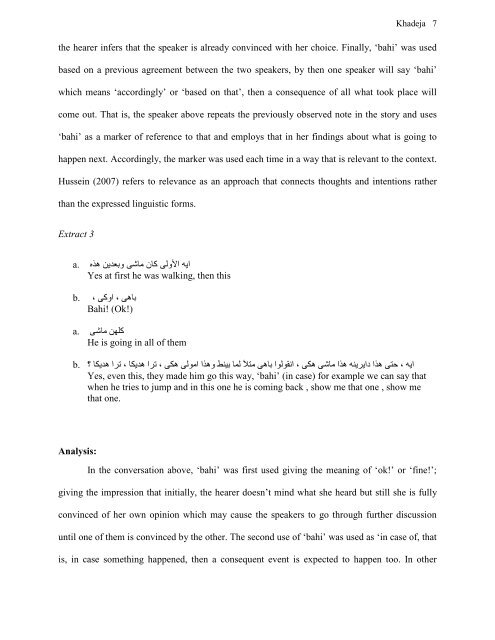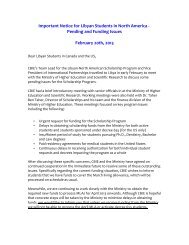Bahi-as-a -Discourse -Marker-in-Daily -Libyan-Arabic
Bahi-as-a -Discourse -Marker-in-Daily -Libyan-Arabic
Bahi-as-a -Discourse -Marker-in-Daily -Libyan-Arabic
Create successful ePaper yourself
Turn your PDF publications into a flip-book with our unique Google optimized e-Paper software.
Khadeja 7the hearer <strong>in</strong>fers that the speaker is already conv<strong>in</strong>ced with her choice. F<strong>in</strong>ally, ‘bahi’ w<strong>as</strong> usedb<strong>as</strong>ed on a previous agreement between the two speakers, by then one speaker will say ‘bahi’which means ‘accord<strong>in</strong>gly’ or ‘b<strong>as</strong>ed on that’, then a consequence of all what took place willcome out. That is, the speaker above repeats the previously observed note <strong>in</strong> the story and uses‘bahi’ <strong>as</strong> a marker of reference to that and employs that <strong>in</strong> her f<strong>in</strong>d<strong>in</strong>gs about what is go<strong>in</strong>g tohappen next. Accord<strong>in</strong>gly, the marker w<strong>as</strong> used each time <strong>in</strong> a way that is relevant to the context.Husse<strong>in</strong> (2007) refers to relevance <strong>as</strong> an approach that connects thoughts and <strong>in</strong>tentions ratherthan the expressed l<strong>in</strong>guistic forms.Extract 3ايه الأولى كان ماشى وبعدين هذه .aYes at first he w<strong>as</strong> walk<strong>in</strong>g, then thisباهى ، اوكى ، b.<strong>Bahi</strong>! (Ok!)كلهن ماشى .aHe is go<strong>in</strong>g <strong>in</strong> all of themايه ، حتى هذا دايرينه هذا ماشى هكى ، انقولوا باهى متلاَ لما بينط وهذا امولى هكى ، ترا هديكا ، ترا هديكا ؟ .bYes, even this, they made him go this way, ‘bahi’ (<strong>in</strong> c<strong>as</strong>e) for example we can say thatwhen he tries to jump and <strong>in</strong> this one he is com<strong>in</strong>g back , show me that one , show methat one.Analysis:In the conversation above, ‘bahi’ w<strong>as</strong> first used giv<strong>in</strong>g the mean<strong>in</strong>g of ‘ok!’ or ‘f<strong>in</strong>e!’;giv<strong>in</strong>g the impression that <strong>in</strong>itially, the hearer doesn’t m<strong>in</strong>d what she heard but still she is fullyconv<strong>in</strong>ced of her own op<strong>in</strong>ion which may cause the speakers to go through further discussionuntil one of them is conv<strong>in</strong>ced by the other. The second use of ‘bahi’ w<strong>as</strong> used <strong>as</strong> ‘<strong>in</strong> c<strong>as</strong>e of, thatis, <strong>in</strong> c<strong>as</strong>e someth<strong>in</strong>g happened, then a consequent event is expected to happen too. In other
















